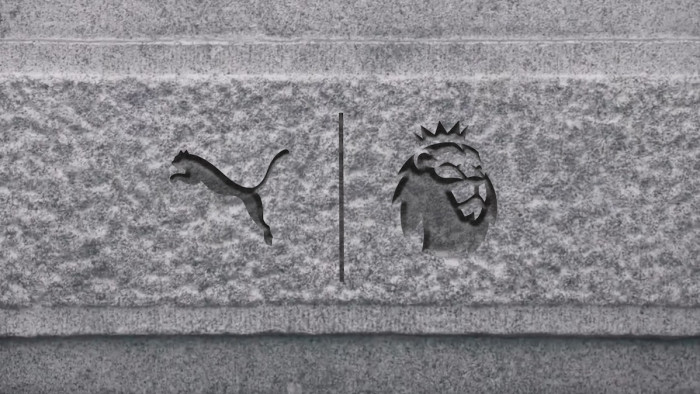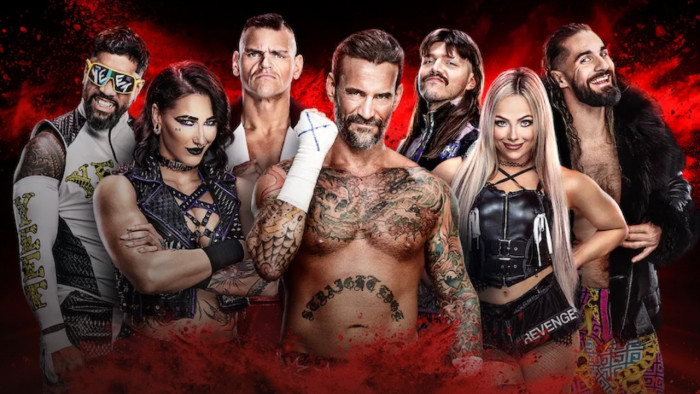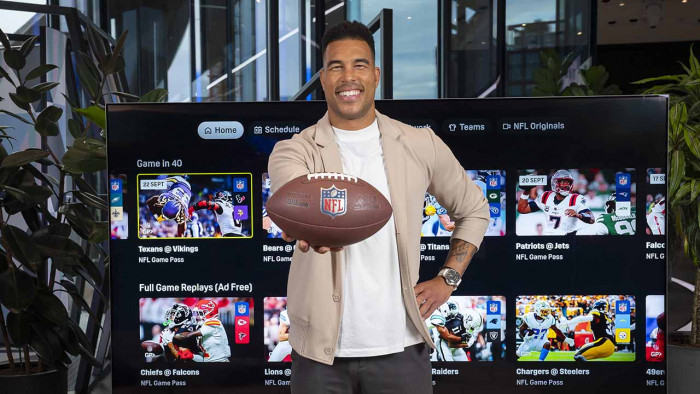How has ‘Red Nev’ transformed himself from the country’s least popular player to its best loved pundit? Tom Ellen visits the set of Sky’s Monday Night Football to find out
How do you sum up Gary Neville in one word? Seriously, think about it.
I only ask because when I’m forced to do so, five minutes into my interview with him at Sky Sports HQ, I manage to get it quite spectacularly wrong.
“’Divisive?’” Neville cackles, rocking back and forth on the chair in front of me. “That’s the most subtle description of myself I’ve ever heard. ‘You were quite a divisive player, Gary.’ What you mean to say is: ‘You were despised up and down the country.’ That’s basically what you’re getting at, isn’t it?”
I nod. It is basically what I’m getting at. He cackles again and shakes his head: “’Divisive!’”
In my defence, it’s far more difficult to sum up Gary Neville in one word than it used to be. Two years ago, he was a hero for Manchester United fans, while everyone else with a passing interest in football considered him a villain, an irritant or, more likely, something we couldn’t print here without excessive use of the asterisk key.
For non-United supporters, Neville’s 19-year tenure at Old Trafford was characterised by a kind of misplaced arrogance. The same chest-thrusting swagger he displayed was acceptable in the likes of Beckham and Cantona, but Neville had neither the star quality nor the seagull-based aphorisms to back it up.
Plus, he often appeared needlessly confrontational, once sprinting half the length of the pitch to celebrate victory in front of Liverpool fans in 2006, saying afterwards, “Are you meant to smile sweetly and jog back to the halfway line?”
In hindsight, he’s right: ‘divisive’ doesn’t quite cut it.
However, the past 18 months have seen a seismic shift in the 38-year-old’s popularity, thanks to his relentlessly brilliant analysis and commentary for Sky Sports, most noticeably on the channel’s former Keys-and-Gray vehicle, Monday Night Football.
While other TV pundits tend to offer little more than bad shirts and tired clichés, Neville bristles with passionate opinion, considered insight and the finest deadpan oneliners since Karl Pilkington first opened his mouth on air. “Sunderland haven’t made one run forward,” he muttered during a recent match. “It’s winding me up and I don’t even want them to win.”
Much has already been written about the idea of him “reinventing” the art of punditry (something he dismisses), but more interesting is the idea of him reinventing himself; winning over hundreds of thousands of people who’d previously revelled in chanting his name between swear words at grounds across the country.
Monday Night Football producer Scott Melvin tells me: “When I first spoke to Gary about taking the MNF job, he talked about how he was disliked [by many fans]. I said to him: ‘The people that dislike you will always dislike you. What we want is for those same people to eventually say, ‘I still don’t like him… but he’s a great pundit.’”
Melvin got what he wanted, and more. Today, even diehard Liverpool and Manchester City fans send Neville complimentary post-match tweets.
“I do get a few of those, yeah,” he concedes. His co-presenter Ed Chamberlin, sitting alongside us, chips in: “He’s being modest; he gets a lot. That’s what I like about doing this show – people didn’t really know Gary before MNF. Now, we can show what he’s actually like. He has a sense of humour, he’s passionate about football... He’s all right.”
THE TURNING POINT
The key to how Neville has transformed himself from the country’s most divisive (all right, “despised”) player to its most beloved pundit lies at the heart of the sprawling west London business estate ShortList is currently sitting in. Sky TV’s gargantuan suburban headquarters house the Monday Night Football set and I’ve come here to see how Neville and the team put the programme together.
Neville arrives at Sky at 9.30am every Monday, brimming with ideas borne from the weekend’s games that he’ll pitch as discussion topics for the evening’s show. “I’m interested in substance,” he tells me. “Everyone has an opinion in football, but to make people trust you, you’ve got to have the facts to back that opinion up.”
He had his first media experience in 2002, dissecting England’s World Cup games for ITV alongside Terry Venables and Paul Gascoigne (“those were really big matches for a 27-year-old to be covering”). Does he, I ask, think he was always destined for punditry?
“Well, I’ve always been a ‘talker’,” he grins. “That’s no secret. Sir Alex Ferguson once said to me: ‘I bet your tongue says a prayer when you go to sleep at night.’ But when I was still playing, I wouldn’t have said that I’d definitely end up in a TV studio. It comes down to the opportunities you get.”
Of course, the most widely-aired concern when Neville’s role at Sky was announced, just a few months after his retirement from football in February 2011, was how neutral his analysis would be. After all, this was a man who’d spent his entire career at one club and even cheerfully dubbed himself ‘Red Nev’. Happily, it was a concern he was adamant to disprove from the start.
“Look, my best friends are Ryan Giggs and Paul Scholes,” he tells me. “That’s a unique situation to be in. So, that was the important thing from the beginning: to prove that I wouldn’t just sit there with a red-and-white scarf round my neck. But everyone who offers an opinion on a football programme has an allegiance to a club, and if they tell you differently, they’re lying. If I think Manchester United played badly, I’ll say it. There have been mistakes made by people I’m close to that I’ve talked about on air. Giggsy made one at Anfield last year – he broke the wall in a free-kick – and I picked him up on that.”
Did Giggs text him straight after the show to say, “Thanks for that, mate”? He laughs: “Probably, yeah. It doesn’t change anything, though.”
What with attempting to remain firmly on the fence while coping with the sheer quantity of research and preparation involved, Neville admits finding the first few shows physically and mentally draining.
“I was so nervous,” he recalls. “I needed water every 10 seconds because my mouth was dry. I didn’t have a clue what to do with my hands. I’ve solved that now, though – I just hold my pen all the time.”
Despite his sandpaper tongue and nomadic hands, Neville’s MNF cohorts insist those early shows were instrumental in shifting the general public’s perception of him.
“That first show was the turning point,” MNF director Duncan East tells me. “At the end of it, Ed said, ‘So, what have we learned tonight?’ and Gary said, ‘That Monday Night Football is tough for Gary Neville.’ With that one quote, he wasn’t the narky United right-back any more; he suddenly became relatable. Human.”
The man himself is predictably more downbeat about the lasting effects of his debut.
“I don’t know what people thought,” he shrugs. “My mum and dad said I did all right.”
TAKING TO THE AIR
Here in April 2013, compliments about Neville’s punditry extend far beyond his immediate family. As I make my way on to the set during rehearsals for this evening’s show, it’s easy to see why.
He’s clearly in his element here, dividing his time between energetically pacing the studio floor, debating subjects for discussion (“Let’s go bigger picture with QPR – they’re getting killed again!”) and bullying pixels into position on his giant, wall-mounted touchscreen. He takes the technical side of the show so seriously that he even had a similar, albeit smaller, interactive screen installed in his home so he could practise ahead of the first show.
The Premier League trophy is also present in the corner of the room (fascinating fact: only those who’ve won it can touch it with bare hands; even its security guards wear gloves), and Chamberlin asks Neville to raise it aloft so he can get a photo.
“No, I couldn’t do that,” says Neville, wincing. “It’s still got the blue ribbons on it.”
After the introductory links and analysis of the weekend’s games, the studio lights dim and tonight’s match – the Manchester derby that City win 2-1 – begins.
Neville remains at his desk throughout, eating his dinner while studying the game from three different camera angles and yammering non-stop at the producers in his earpiece. This relentless stream-of-consciousness is part pub commentary (“Oh, Giggsy, no – you’ve got to play Wazza in there!”), part editorial direction (“Save that clip – it shows United’s power on the counter-attack, as we talked about before the match”), with the occasional AA Gill-level gastro-review woven in (“Tell you what, this Bakewell tart is superb. Custard and everything”).
I’m beginning to see why Chamberlin likens controlling Neville’s on-screen passion to “driving a Formula 1 car”.
NORTHERN HERO
A big part of Neville’s appeal as a pundit is his frankness. In a sport renowned for its superhumanly tedious soundbites, where “The lads gave 110 per cent” constitutes a broadcast-worthy interview, his tendency to say what he really thinks is refreshing and occasionally makes you wonder whether he’s forgotten that he’s speaking live to millions of people.
At one point during the look back at the weekend’s games, Neville dismisses a sloppy error by QPR’s Adel Taarabt with the statement: “I could lay into him but, y’know, what’s the point?” The cameramen around me raise their fists to their mouths in unison to muffle their laughter, drawing disapproving glares from the director.
Arguably Neville’s finest comic moment, though, came back in April 2012 when, three months before the emergence of Gangnam Style, he proved that he, too, could turn an unpleasant, highly confusing noise into a YouTube sensation. We refer, of course, to what has become known as the ‘goalgasm’ – the strange warbling sound Neville omitted while commentating on the Fernando Torres goal that propelled Chelsea to last year’s Champions League final.
“That was just about... what’s the word?” he ponders. “Spontaneity. That goal was a big moment for English football.”
Does he get fans making that noise at him in the street? “Sometimes, yeah,” he laughs. “It’s quite annoying, to be honest.”
The thing you come to realise as you spend time with Neville is that it’s the same traits people deplored in him as a player that they now find appealing in him as a pundit. His bolshiness, his refusal to back down and his magnet-like attraction to controversy; these are the reasons MNF is becoming increasingly unmissable.
Put simply: Neville is a naturally outspoken man who is now in a job where being naturally outspoken is actively encouraged. While QPR’s Joey Barton is slammed for saying too much, Match Of The Day’s Alan Shearer gets stick for saying too little. Does Neville think there’s anything in the idea that fans like opinionated analysts, but not opinionated footballers?
“I think fans don’t like outspoken players from other clubs,” he laughs. “But when you’re on TV, it’s different; you have to have an opinion. Otherwise, what’s the point of you being there? I suppose I have noticed a change in people’s perception towards me [since joining Sky], but I’ve not changed, personally. It’s just that people don’t really know you [when you’re playing]. They just see you out there every week with some team’s shirt on your back. With me, how I am [on MNF] is how I am in normal life.”
“What, funny?” asks Chamberlin.
“No, not funny,” says Neville. “I’m just…” He breaks off, searching for the right word. “Northern.”
And then he’s rocking back in his chair again, his cackles ringing around the room, and I’ve finally figured out how to sum up Gary Neville in one word.
Sky Sports is the home of football with more than 500 live matches every season including Barclays Premier League, Uefa Champions League and more
Latest
Related Reviews and Shortlists










